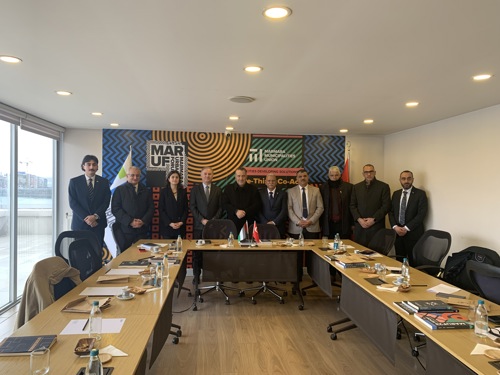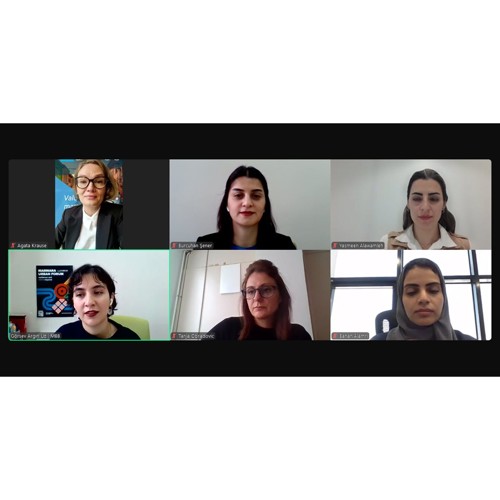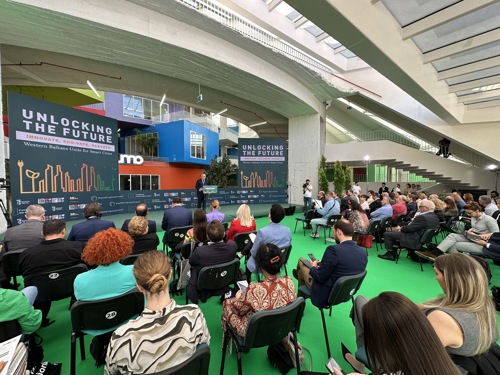Local Diplomacy
More than half of the world’s population lives in cities. With the increasing speed of urbanization and the effect of globalization, the roles, opportunities, responsibilities and areas of influence of cities are growing. In this “age of cities”, cities now operate in interaction with each other as global actors, establish sister city relationships, create international city networks, and develop thematic collaborations with many international stakeholders. Cities are actually the starting point of most of the global problems today, but they also play a key role in the solution of these problems. Moreover, they contribute to the establishment of a global culture of peace and coexistence. Hence, local diplomacy emerges as an approach that is different from traditional diplomacy but that also supports it. Local diplomacy utilizes many soft power elements as a tool, and pushes cities, implementation and result-oriented mechanisms, to the forefront at the global level.
Marmara Municipalities Union executes various activities to raise awareness about local diplomacy for the local governments in the Marmara Region, to lay the groundwork for information and experience sharing, to spread good practices and to create cooperation networks. The Local Diplomacy Platform consists of member municipalities' foreign relations representatives, and the platform encourages to use local diplomacy as an effective tool in developing a culture of cooperation, solidarity and dialogue with international stakeholders, building an international peace and reconciliation environment, and solving global problems with local implications such as climate change and migration.
MMU works to ensure that local diplomacy activities of municipalities comply with national policies and international conventions and to link them to the global agenda -especially the Sustainable Development Goals-, and to shape the national and international norms and agenda according to the demands and needs of municipalities. It organizes activities to support the work of local governments and reinforce their capacities in areas such as diplomacy and rules of protocol, access to international projects, competitions and funding appeals, participation in international meetings, sister city relations, relations with international city networks and organizations, public diplomacy, and project management.
MEMBERSHIPS TO INTERNATIONAL ORGANIZATIONS
European Association for Local Democracy (ALDA)
ALDA was established in 1999 at the initiative of the Council of Europe's Congress of Local and Regional Authorities and aims to promote good governance and citizen participation and improve cooperation between local authorities and civil society. ALDA has more than 350 members, including local authorities, associations of local authorities, and civil society organizations coming from more than 45 countries. MMU has been a member of ALDA since 2017.
For more information on ALDA: alda-europe.eu
Energy Cities
Energy Cities was established in Brussels in 1990 with the aim of radically changing the energy policies and systems of European cities based on locality and sustainability, contributing to the efforts of ensuring that Europe becomes a climate-neutral continent by 2050, and recognizing local authorities as key players in the process of energy transformation. The network gathers more than 170 cities from 30 different countries under a single roof and carries out works encouraging the use of renewable energy and smart technologies that provide energy efficiency, and careful resource consumption. In addition, the network conducts advocacy and dialogue activities in the European Union and member states to increase the impact of local governments in the energy transition process. MMU has been a member of Energy Cities since 2023.
For more information on Energy Cities: energy-cities.eu
European Metropolitan Authorities (EMA)
MMU became a member of the European Metropolitan Authorities (EMA) in 2025. Established in 2015 by the Barcelona Metropolitan Area and based in Barcelona, Spain, the network brings together leading European metropolises and metropolitan areas. Metropolises are centers of prosperity, opportunity, innovation, and productivity, yet they also concentrate challenges such as unemployment, poverty, housing shortages, transport issues, and air pollution. EMA facilitates the exchange of solutions to these shared urban challenges and promotes joint projects among European metropolitan governments.
The network collaborates with other European and global organizations such as Metropolis, Eurocities, and Metrex, and maintains active dialogue with the European Union. Each year, the EMA Forum is held in a different European metropolis, providing a platform for sharing policies and experiences on metropolitan governance, discussing solutions, and adopting joint declarations.
For more information on EMA: https://www.amb.cat/en/web/amb/area-internacional/ema
Global Alliance for Care
MMU became a member of the Global Alliance for Care in 2025, which was established in 2021 by UN Women and the Mexican National Institute for Women (INMUJERES) in response to the increasing care needs following the COVID-19 pandemic. Global Alliance for Care is the first global multi-stakeholder platform that advocates for recognizing care as a need, work, and right. It fosters collaboration among governments, local authorities, civil society, academia, and the philanthropic sector to support the development and implementation of the care agenda and policies at the local and global level. The network brings together more than 250 members, including prominent international organizations such as UCLG, Metropolis, JICA, UN Women, and the ILO as well as 30+ municipalities from all around the world. MMU has been the first member of the Alliance from Türkiye. The Alliance promotes knowledge exchange, events, and capacity-building activities with the aim of achieving an equitable, inclusive, and sustainable care system.
For more information on the Global Alliance for Care: https://www.globalallianceforcare.org/en/
Global Urban Observatory Network (GUO-Net)
MMU became a member of the Global Urban Observatory Network (GUO-Net), established by UN-Habitat, in 2025. Developed by UN-Habitat, the Urban Observatory Model is an innovative tool designed to support the collection, monitoring, and analysis of city-level data. Under this model, the Global Urban Observatory Network (GUO-Net) coordinates 374 urban observatories worldwide. The network aims to strengthen data capacities at national and local levels, enhance knowledge sharing, and promote evidence-based urban governance.
GUO-Net focuses on generating reliable and city-specific data sets, supporting their use in effective urban policymaking, improving decision-making processes through participatory approaches, and facilitating information exchange related to the implementation of the New Urban Agenda. The network also offers capacity-building programs, supports city-to-city cooperation, and contributes data for global reports such as UN-Habitat’s biennial World Cities Report.
For more information on GUO-Net: https://unhabitat.org/initiative/global-urban-observatories
Global Water Operators’ Partnerships Alliance (GWOPA)
The network was established in 2009 in Bonn, Germany by UN-Habitat and consists of water and sewerage administrations and other related organizations. The aim of the network, which includes nearly 500 members and partner organizations, is to assist water and sewerage administrations worldwide in providing quality services and supporting each other. In this context, GWOPA conducts capacity-building activities and promotes the sharing of knowledge and experience among its members. It provides tools and guidance to its members in research and development, reporting, and monitoring. It creates a platform for its members to develop international collaborations and follow global developments. The network contributes to the realization of the 6th Sustainable Development Goal, which focuses on access to clean water and sanitation. MMU has been a member of GWOPA since 2023.
For more information on GWOPA: gwopa.org
Local Governments for Sustainability (ICLEI)
ICLEI aims to create a rapidly developing urban life by considering sustainability ideals. The network includes over 2500 local and regional governments from 125 countries and was established in Toronto in 1990. ICLEI aims to influence the sustainability policies of its members and promote low-emission, nature-focused, fair, resilient, and circular development. ICLEI promotes connections between local and regional actors and brings together different sectors such as public institutions, international organizations, financial institutions, and NGOs through its events. Furthermore, ICLEI provides its members with opportunities to showcase their practices on global channels and represent them at global forums. MMU has been a member of ICLEI since 2023.
For more information on ICLEI: iclei.org
International Observatory of Participatory Democracy (IOPD)
MMU became a member of the International Observatory of Participatory Democracy (IOPD) in 2024. The network, established in 2001, aims to strengthen participatory democracy practices at the local level. Based in Barcelona, Spain, the network primarily focuses on rewarding and disseminating good practices in citizen participation at the international level, contributing to the process of knowledge production in the field of participatory democracy, fostering cooperation among its members, and developing policy recommendations for public administrations. Among these efforts are the annual international conference and the "Best Practice in Citizen Participation Award." Additionally, it shares publications and experiences of good practices and current information on participatory democracy on its website.
For more information on IOPD: oipd.net/en/
Local and Regional Time Network
MMU became a member of the Local and Regional Time Network in 2025. Established in 2021 in Spain by the Time Use Initiative (TUI), the network brings together cities and regions around the world that promote and implement time policies. Member institutions commit to time reorganization by signing the Barcelona Declaration on Time Policies. The network aims to enhance citizens’ quality of life and ensure the right to time. Time policies developed to address time poverty—particularly affecting women, youth, and low-income groups—support initiatives in areas such as work-life balance, paid and unpaid work, care, leisure, participation, and rest. In this context, the network engages in knowledge and best practice sharing, capacity-building, and advocacy activities.
For more information on Local and Regional Time Network: https://timeuse.barcelona/local-and-regional-governments-time-network/
Network of Associations of Local Authorities of South-East Europe (NALAS)
NALAS, which is in close contact with the Congress of Local and Regional Authorities of the Council of Europe, is a non-political, independent, and multicultural network. Headquartered in Skopje, the capital of North Macedonia, NALAS contributes to increasing the capacities of local authorities in the region and works in accordance with the principles of the European Charter of Local Self-Government. NALAS consists of the local government associations (LGAs) of Albania, Bulgaria, Bosnia and Herzegovina, Croatia, Montenegro, Kosovo, Macedonia, Moldova, Romania, Serbia, Slovenia, and Türkiye (MMU). The Network brings together 13 Associations that represent roughly 9000 local authorities, directly elected by more than 80 million citizens of this region. MMU is actively involved in working groups and projects operating in various fields within NALAS and has been a member of NALAS since 2008.
For more information on NALAS: nalas.eu
Union of Turkish World Municipalities (TDBB)
Founded in Istanbul in 2003, TDBB has member municipalities and associations from Türkiye, Azerbaijan, Kyrgyz Republic, Bosnia and Herzegovina, Republic of Dagestan, Turkish Republic of Northern Cyprus, Moldova, Mongolia, Macedonia, Republic of Iraq, Republic of Kosovo, Islamic Republic of Pakistan, Hungary, Kazakhstan. MMU has been a member of TDBB since 2010.
For more information on TDBB: tdbb.org
United Cities and Local Governments Middle East and West Asia Regional Organization (UCLG-MEWA)
UCLG-MEWA is a regional local government association with over 200 members. The secretariat of UCLG-MEWA, one of the nine regional sections of the UCLG World Organization, the world’s largest local government association, is located in Istanbul, Türkiye. The International Union of Local Authorities Eastern Mediterranean and Middle East Regional Organization (IULA-EMME) was established in 1987 in Istanbul, as the regional unit of IULA, the world organization. IULA-EMME was transformed into UCLG-MEWA in 2004, parallel with the restructuring of the world organization. UCLG-MEWA aims to create cooperation between local governments in the region, to protect their values, goals and interests, and to bring the voice of local to the global. MMU has been a member of UCLG-MEWA since 2014 with the status of local government.
For more information on UCLG-MEWA: uclg-mewa.org
NATIONAL COORDINATING & SUPPORTING ROLES
Covenant of Mayors Supporter
Marmara Municipalities Union has been the only supporting organization of the Covenant of Mayors (CoM) in Türkiye since 2011. Launched by the European Commission in 2008, the Covenant of Mayors for Climate and Energy (CoM Europe) aims to involve and support mayors in achieving the European Union's climate and energy goals. It brings together thousands of cities and regions voluntarily committed to implementing climate and energy objectives. Based on the strength of a multi-stakeholder movement, signatory cities and regions contribute voluntarily to this initiative by achieving goals set at the regional or national level within the framework of sustainability, preparing sustainable energy action plans subject to monitoring. The signatories of the Covenant commit to adopting an integrated approach to mitigate and adapt to the effects of climate change.
For more information: https://eu-mayors.ec.europa.eu/en/home
European Week for Waste Reduction (EWWR) National Coordinator
Marmara Municipalities Union has been the national coordinator of the European Week for Waste Reduction (EWWR) in Türkiye since 2020. The EWWR is an initiative that aims to promote the implementation of awareness-raising actions on sustainable resource and waste management for a single week. The EWWR project has aimed to raise awareness about waste reduction, reuse of products, and recycling strategies since 2009. To achieve this goal, the project highlights the activities of EWWR participants, encourages a focus on four main activity themes (Reduce, Reuse, Recycle, and Clean up Europe), and strengthens stakeholder capacities through targeted communication tools.
For more information: https://ewwr.eu/
European Local Democracy Week (ELDW) National Coordinator
Marmara Municipalities Union has been among the national coordinators of the European Local Democracy Week (ELDW), which is a pan-European event aiming at boosting local democracy and citizen participation, since 2010. This initiative is coordinated by the Congress of Local and Regional Authorities of the Council of Europe. Local authorities from the 46 Council of Europe member States and their associations are invited to register and organise public events to promote and foster democratic participation at grassroots level. Local authorities from other countries are also welcome to report local democracy week activities organised with citizens in their communities. In this context, as national coordinating authority, MMU supports municipalities for the implementation of ELDW activities.
For more information: https://www.congress-eldw.eu/

Voluntary Local Reviews: SDG Reporting to Action to Be Held Online on June 19
10.06.2025 Read More >
Association of Palestinian Local Authorities Visited Marmara Municipalities Union
20.01.2025 Read More >
UN-Habitat and Marmara Municipalities Union Host Quality of Life Initiative Webinar
29.11.2024 Read More >
